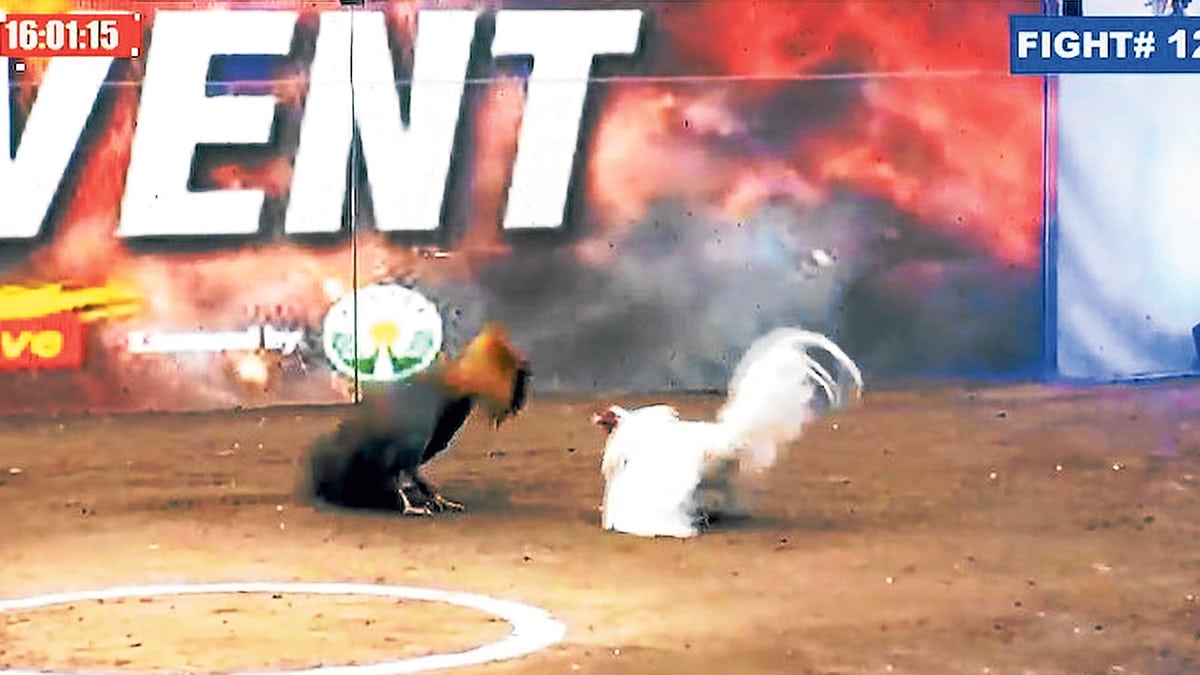
Screengrab from PITMASTERLIVE
MANILA, Philippines — Pro-administration members in the House of Representatives said on Wednesday that they were firmly against the revival of online cockfighting, or “e-sabong,” to make up for income losses from President Ferdinand Marcos Jr.’s ban on Philippine overseas gaming operations (Pogos).
Speaking to reporters, Laguna Rep. Dan Fernandez, Manila Rep. Bienvenido Abante Jr., and Antipolo Rep. Romeo Acop pointed out that the same issues that hounded Pogos—disappearances, abuses, and corruption—had also been noted in e-sabong which should therefore remain banned.
In addition to earlier laws on gambling, former President Rodrigo Duterte legalized online gaming in 2017 through Executive Order No. 13, which was purportedly meant to “strengthen the fight against illegal gambling.”
READ: As Pogos exit, ‘e-sabong’ revival raised at House
But his order also allowed the Philippine Amusement and Gaming Corp. (Pagcor) to license online gaming establishments like online cockfighting and Pogos.
Online cockfighting resumed operations in April 2021, but Duterte banned the practice in May 2022 following the disappearance of 30 cockfighters believed to have incurred debts in e-sabong operations.
Many of the missing cockfighters were actually from Abante’s district in Manila.
“It’s why [I think] any form of gambling promotes corruption,” Abante said. “I disagree that it helps with economic development. Look at Malaysia and the [United Arab Emirates] which ban gambling, but they are rich nations.”
Echoed Fernandez: “If we replace e-sabong with Pogos, it’s the same banana. I think Filipinos can survive without either of them. Just let it be and one day we would be able to recoup our losses from the Pogo ban.”
“Remember, when we were discussing Pogos, we were balancing economic versus social ills,” echoed Acop.
Same addiction
“As far as I have observed on the ground, e-sabong has affected so many homes, because many breadwinners have been incurring debts to the point that they are no longer able to provide for their families. It’s the same gambling addiction,” he said.
There are actually no proposals in Congress for the revival of online cockfighting, but OFW party list Rep. Marissa Magsino suggested that Pagcor legalize e-sabong to help recoup losses from the Pogo ban.
During the House committee on appropriations briefing for Pagcor’s proposed 2025 budget, Magsino argued that e-sabong was “still happening everywhere, and there’s a lot of people that know it’s happening, so I think that it’s better to just make it legal rather than keep it illegal, and we’re not gaining anything from it.”
Pagcor Chair Alejandro Tengco said that from April 2021 to April 2022 alone, Pagcor generated P6.2 billion worth of e-sabong revenues.
In 2023, Pagcor reported revenues of P79.37 billion, even without e-sabong, and that was P20.41 billion more than its income of P58.96 billion for 2022.
Tengco said the government would lose P7 billion to 7.5 billion because of the Pogo ban, but that still leaves more than P70 billion.
“I brought up this concern with Congress and the Senate [definitely] because the loss seems such a waste, but then again, there are also social consequences,” he said.
“Now, in relation to your next question, are we studying [reviving e-sabong]? Well, we have studied it and have a few suggestions, and we believe we can enhance the structure or the guidelines. But until a law or an order [from the] President of the Philippines comes out, our hands are tied,” he added.
“Only if there is an enabling law allowing it to come back, then that’s the only time we can exercise our jurisdiction [over e-sabong],” Tengco said.

